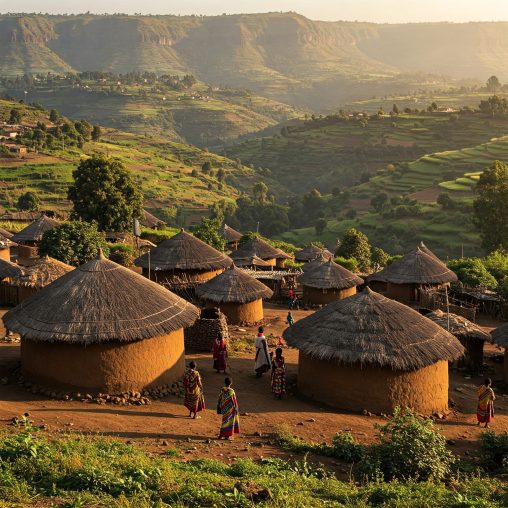Ethiopia, a nation steeped in millennia of history and blessed with breathtaking natural landscapes, stands as a testament to resilience and unique cultural identity. Often referred to as the “Cradle of Humankind” and the “Roof of Africa,” this East African nation offers a compelling narrative that extends far beyond common perceptions. This blog delves into some of the most captivating and professionally significant facts that underscore Ethiopia’s remarkable place in the world.
Here are some amazing facts about Ethiopia:
Historical & Cultural:
- One of the Oldest Countries: Ethiopia is the oldest independent country in Africa and one of the oldest in the world, with a history stretching back over 3,000 years.1
- Never Colonized (Mostly): Ethiopia is the only African country that was never formally colonized by a European power. While Italy occupied the country for about five years (1936-1941), Ethiopia maintained its sovereignty. Liberia also shares a similar history of not being colonized by European powers.2
- Own Calendar and Time System: Ethiopia uniquely uses a calendar with 13 months, which is about seven to eight years behind the Gregorian calendar.3 They also have a 12-hour clock system that starts counting from dawn (1 o’clock) and dusk (1 o’clock).4
- Birthplace of Coffee: The wild coffee plant, Coffea arabica, is native to Ethiopia. Legend says a 9th-century goat herder discovered coffee when he noticed his goats became energized after eating the beans.
- Origin of the Rastafarian Movement: While the Rastafarian movement developed in Jamaica, its spiritual roots lie in Ethiopia, with Emperor Haile Selassie I considered a key figure.5 “Ras” means chief in Amharic, and “Tafari” was Selassie’s first name.6
- Own Alphabet: Ethiopia is the only country in Africa with its own unique and ancient written alphabet and script, called Ge’ez script, which is still in use today.
- Believed Home of the Ark of the Covenant: The Ethiopian Orthodox Church claims to house the Ark of the Covenant, which holds the Ten Commandments, in St. Mary of Tsion Church in Aksum. Only a select guardian is allowed to view it.
- A Land of Festivals: Ethiopia has a rich tradition of vibrant festivals, with Timket (Epiphany), a three-day celebration of Jesus’ baptism, being the largest.
- Cultural Mosaic: Ethiopia is a multicultural and multi-ethnic country with over 80 different ethnic groups and languages, each with unique traditions and customs.
Geographical & Natural Wonders:
- “Roof of Africa”: About 70% of Africa’s mountains are located in Ethiopia, earning it the nickname “Roof of Africa.”
- Highest Capital in Africa: Addis Ababa, the capital city, is the highest capital in Africa, situated at an altitude of around 2,400 meters (7,900 feet).
- Source of the Blue Nile: Lake Tana, Ethiopia’s largest lake, is the source of the Blue Nile River, which eventually joins the White Nile to form the Great Nile. The Blue Nile contributes a significant amount of water to the Nile’s flow.
- Hottest Inhabited Place: Dallol, located in the Danakil Depression in Ethiopia, holds the record for the highest average temperature for an inhabited place on Earth.
- Longest Existing Lava Lake: The Erta Ale volcano in the Danakil Depression has the world’s longest continuously existing lava lake, which has been active since 1906.
- Numerous UNESCO World Heritage Sites: Ethiopia boasts the most UNESCO World Heritage Sites in Africa, including Aksum, Lalibela rock-hewn churches, Simien National Park, and others, reflecting its rich history and natural beauty.
- Significant Biodiversity: Ethiopia is home to a diverse range of flora and fauna, including several endemic species like the Ethiopian wolf and the gelada baboon.
Other Amazing Facts:
- Cradle of Humankind: Ethiopia and the surrounding region are considered a crucial area in palaeontology, with the discovery of some of the oldest hominid fossils, including the famous “Lucy” (Australopithecus afarensis) and the older “Ardi” (Ardipithecus ramidus).
- Diplomatic Capital of Africa: Addis Ababa is often referred to as the “diplomatic capital of Africa” as it hosts the headquarters of the African Union (AU) and the United Nations Economic Commission for Africa (UNECA).
- Pioneering Olympic Gold Medalist: Abebe Bikila, an Ethiopian, was the first black African to win an Olympic gold medal, achieving this in the marathon at the 1960 Rome Olympics while running barefoot. He later won again in Tokyo in 1964, setting a world record.
These are just some of the many amazing facts that make Ethiopia a truly unique and fascinating country!
In conclusion, Ethiopia presents a compelling narrative of ancient civilization, resilient independence, breathtaking natural wonders, and a vibrant cultural mosaic. Its unique history, geographical diversity, and significant contributions to human history and global affairs solidify its position as a truly remarkable and professionally significant nation on the African continent and the world.
Discover more from Nexus
Subscribe to get the latest posts sent to your email.
